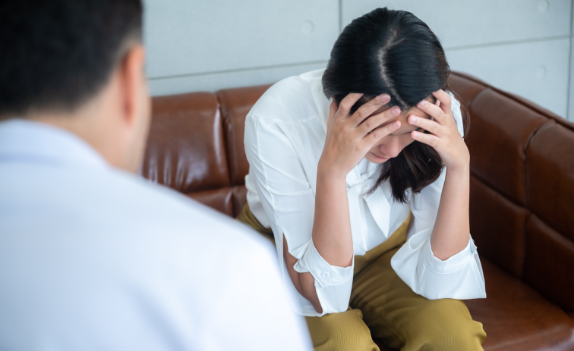Depression Counseling
Many people face life challenges impacting their joy and daily activities. Such difficulties can interfere with how you feel, think, or behave. Talking to a counselor aids in overcoming these problems.
Many individuals experiencing depression may not realize that assistance is within reach. Major depressive disorder is a condition that can be effectively treated, even though it may appear impossible when one is in its grip.
Depression
Depression is a mental health condition defined by constant hopelessness, sadness, and a lack of interest in daily activities. It can affect a person’s overall well-being, often leading to physical, emotional, and cognitive disturbances.
Depression is widespread, affecting approximately one in 15 adults each year. Plus, the American Psychiatric Association approximates that depression affects one in every six individuals at some point in their lifetime.
While depression is a common mental illness, it’s still subject to societal stigma. For one, there’s a belief that it’s a sign of weakness or merely a negative attitude that someone can “snap out” of. Unfortunately, such misinformation can prevent people from seeking the professional help they need.
Our team at Rego Park is now certified in mental health counseling. We provide compassionate and effective depression counseling to those needing assistance on their recovery path. Reach out to us today to learn more.
Request A Call From Us
Causes of Depression
Depression is a common condition with many potential triggers and causes. It rarely manifests abruptly. Instead, it evolves gradually over extended periods, often culminating in a relentless descent into emotional turmoil. Here are some causes of depression:
- Biological Factors: Imbalances in neurotransmitters like serotonin and dopamine can contribute to depression. Genetics may play a role, as depression can run in families.
- Psychological Factors: Stressful life events such as loss, trauma, or chronic stress can trigger depression. Negative thought patterns and low self-esteem can also be contributing factors.
- Environmental Factors: Social isolation and lack of a strong support system can increase the risk of depression. Substance use, including alcohol or drug misuse, can cause or trigger depression.
- Medical Conditions: Certain medical conditions like chronic illness, chronic pain, or hormonal imbalances can lead to depression. Medications with depressive side effects can also be a factor.
Remember, depression is often the result of a combination of these factors. Its causes can vary from person to person.
How Depression Counseling Can Help
Depression counseling aims to help patients understand, manage, and overcome their negative thoughts and emotions. By utilizing various evidence-based therapies, such as cognitive-behavioral therapy (CBT), depression counseling can enable patients to develop constructive coping mechanisms.
Depression therapy also provides a safe, non-judgmental environment for patients to share their feelings. Mental health counseling addresses any underlying problems that may contribute to depression. Some of the key benefits of depression therapy include:
- Enhanced self-awareness: Counseling can help patients recognize their negative thought patterns and understand their triggers. It allows them to respond more effectively to life’s challenges.
- Improved communication and interpersonal skills: Depression can strain relationships. Engaging in therapy helps develop effective communication skills for fostering healthy connections.
- Reduced symptoms: Depression symptoms often improve with counseling. Therapy leads to decreased sadness, better sleep, and increased energy.
- Increased ability to make positive changes: Counseling empowers patients to take control of their mental health, guiding them toward healthier behaviors and lifestyles.
Dealing with depression can feel overwhelming. But, support from a mental health professional can be invaluable. Reaching out for help is a courageous step. Our specialized depression therapy will help you make positive changes and regain control over your mental and emotional well-being.


Signs and Symptoms of Depression
Depression is a common yet severe mental health condition. Depression therapy can help identify the signs of depression and assist patients in overcoming it. If you’re unsure if you may be suffering from depression, consider working with a professional counselor to address your concerns.
Below are common signs and symptoms of depression:
- Prolonged sadness or hopelessness: A person with depression may experience a constant feeling of despair that can affect their daily life and ability to perform regular tasks.
- Lack of motivation: Individuals suffering from depression may lose interest in hobbies or activities they once enjoyed, causing them to withdraw from social situations.
- Appetite and weight changes: Depression can lead to a significant increase or decrease in appetite, resulting in substantial weight gain or loss.
- Sleep disturbances: People with depression often struggle with either insomnia or excessive sleeping. It can further exacerbate their emotional and physical well-being.
- Fatigue or lack of energy: Those with depression may experience persistent exhaustion. It makes it difficult for them to complete daily tasks and maintain a normal routine.
- Low self-esteem or guilt: Depressed individuals may experience pervasive feelings of worthlessness, self-blame, or guilt. It can cause a downward spiral of negative self-perception.
Therapy for depression focuses on understanding the patient’s unique needs. It develops a tailored treatment plan to address the symptoms they are experiencing. By seeking help at a mental health counseling center, patients can learn and regain control over their lives. In some cases, depression can co-occur with substance use issues. Our mental health facility can provide integrated treatment for both concerns if required.
Types of Depression
There are several types of depression, each with its unique characteristics. Here are common types of depression.
1. Major Depression
Major depression is also referred to as clinical depression or major depressive disorder. It’s characterized by constant feelings of:
- Sadness
- Hopelessness
- General loss of interest
A combination of genetic, environmental, and psychological factors can cause it. To try and avoid it, one needs to maintain a healthy lifestyle. This includes regular exercise and sufficient sleep, which can help prevent or alleviate symptoms.
2. Seasonal Affective Disorder (SAD)
SAD is a form of depression that happens during specific seasons. It’s mostly common in the winter months when there is less sunlight. It’s estimated that millions of people suffer from SAD without knowing it.
SAD is often caused by the body’s disrupted circadian rhythm and a drop in serotonin levels. One way to minimize the risk of SAD is by taking advantage of natural light exposure during the day. This can help increase serotonin levels.
3. Postpartum Depression
Postpartum depression is a severe form of depression that affects women following childbirth. Hormonal changes and the emotional challenges of new parenthood can cause it.
Maintaining a strong support system of friends, family, and healthcare professionals is recommended. This can help ease the transition and provide emotional stability during this time.
4. Persistent Depressive Disorder
Persistent depressive disorder, or dysthymia, is a form of depression that lasts long. It’s often marked by a low mood persisting for about two years.
Genetic, environmental, and neurochemical factors may cause Dysthymia. Seeking depression therapy can help manage persistent depressive disorder.
5. Bipolar Disorder
Bipolar disorder is also known as manic-depressive illness. It’s characterized by extreme mood swings, with periods of depression and episodes of mania.
The actual causes are still unclear but can include genetic, environmental, and neurological factors. Maintaining a regular sleep schedule and seeking therapy can help regulate moods and stabilize the condition.
How to Treat Depression
Recognizing depression as a serious condition is the first step towards treatment. One must understand that it is as real as any physical ailment and requires professional help.
Counseling Methods
Treating depression revolves around psychological counseling or psychotherapy. Here are some of the commonly used methodologies:
1. Cognitive Behavioral Therapy (CBT)
CBT involves identifying the negative thought patterns that contribute to and exacerbate depression. The patient learns to redirect these thoughts and develop healthier, more positive cognitive-behavioral responses.
For instance, suppose one is faced with a challenging situation. In that case, instead of saying, “I can’t do this,” a CBT-trained patient would say, “I will do my best”.
2. Interpersonal Therapy (IBT)
IBT focuses on improving the patient’s relationships with other people and enhancing social skills. It helps individuals to express their emotions better and handle situations that may trigger depression. One could learn, for example, how to handle conflict in relationships or cope with losing a loved one.
3. Dialectical Behavioral Therapy (DBT)
DBT is composed of both group and individual therapy. It teaches patients mindfulness, emotional regulation, and distress tolerance. This therapy can help patients struggling with suicidal thoughts channel their feelings in a healthier and safer way.
Medication
Medications are often prescribed along with therapy. They can help in alleviating the symptoms of depression by balancing neurochemicals in the patient’s brain. The most commonly used antidepressants are:
- Selective Serotonin Reuptake Inhibitors (SSRIs)
- Serotonin and Norepinephrine Reuptake Inhibitors (SNRIs)
- Tricyclic antidepressants (TCAs)
- Atypical antidepressants
Remember, medication should be taken under the guidance of a mental health professional.
Healthy Lifestyle Changes
A few simple changes in daily habits can significantly boost mood and well-being. Regular exercise releases endorphins, the feel-good chemicals, and can help lift depression. A healthy diet rich in fruits, vegetables, lean proteins, and whole grains can improve mental health. Adequate sleep and joining a support group are equally important.
Generally, the healing journey can be challenging. But with the right strategies, tools, and professional help, patients can return to healthy, productive lives.
Teletherapy vs. Inpatient Therapy
It’s not uncommon for patients to find themselves deciding between teletherapy and inpatient therapy. While they differ in their delivery approach, their core aim remains the same. They provide patients with the support, tools, and techniques to manage and overcome depression.
Teletherapy leverages technology to deliver therapy through video calls, offering flexibility and comfort. Patients can access therapy sessions from anywhere. It eliminates geographical constraints and commute times.
Inpatient therapy, on the other hand, takes place within a mental health counseling center. It provides an immersive therapeutic environment overseen by a dedicated team of professionals.
While the delivery methods differ, don’t let this divergence fool you. The efficacy of both approaches is nearly indistinguishable.
Choosing the right form of therapy comes down to the individual patient’s:
- Needs
- Circumstances
- Personal preferences
Generally, both teletherapy and inpatient therapy can assist in navigating through depressive symptoms. They teach adaptive coping strategies and facilitate profound healing, irrespective of the treatment modality chosen.

Depression Therapy with Rego Park
Depression, a menacing mental health disorder, can cloud lives with a shroud of despair. Rego Park aims to lift you from this lonely state through our comprehensive Depression Counseling services.
At Rego Park, we aim to help patients open the door to a rewarding life unhindered by the weight of depression. Our dedicated team of certified counselors leverages in-depth understanding with up-to-date, robust therapeutic practices. This ensures a personalized counseling approach that aligns with each patient’s unique circumstances and needs.
But here’s the thing – the first step can often be the hardest. Admitting the need for help is a significant stride toward healing. Should you take this step with Rego Park, you initiate a journey marked with empathy, understanding, and effective strategies for overcoming depression.
While primarily focused on mental health depression, we also understand the intricate link between depression and substance use. There are times when these two issues co-exist, making individuals struggle more. In such cases, we address both. We help patients free themselves from the intertwined chains of depression and substance use.
Let Rego Park be your beacon, guiding you out of the storm into a calm, enriching life. Make the active choice to seek help today. Fill out our contact form below or call us now at (718) 459-2558.
Types of Therapy Offered
Rego Park Counseling offers different types of therapy that are appropriate for various types of people and settings. Find out which kinds of therapy are recommended for you.
Individual Therapy
Individual therapy enables you and your counselor to develop individualized treatment plans that are based on his or her professional assessment. Our personalized programs are fine-tuned to your specific mental health needs and goals as a patient. We recommend individual therapy for everyone since healing must begin with oneself.
Family Therapy
Family therapy can improve the dynamics among the various family members of your family. It can also facilitate the gradual mending of relationships that may have been broken or damaged because of mental health issues. We recommend family therapy for you if your family are interested in supporting you throughout the process and you feel mutually inclined.
Request a Call Call Now Learn More
Group Therapy
Group therapy makes it possible for a group of people who are connected for personal or professional reasons to encourage and guide each other during the recovery period. We recommend group therapy for you if you feel more confident about tackling mental health challenges with the aid of a support group. Finally, a diverse combination of all forms of therapy may serve you best.
